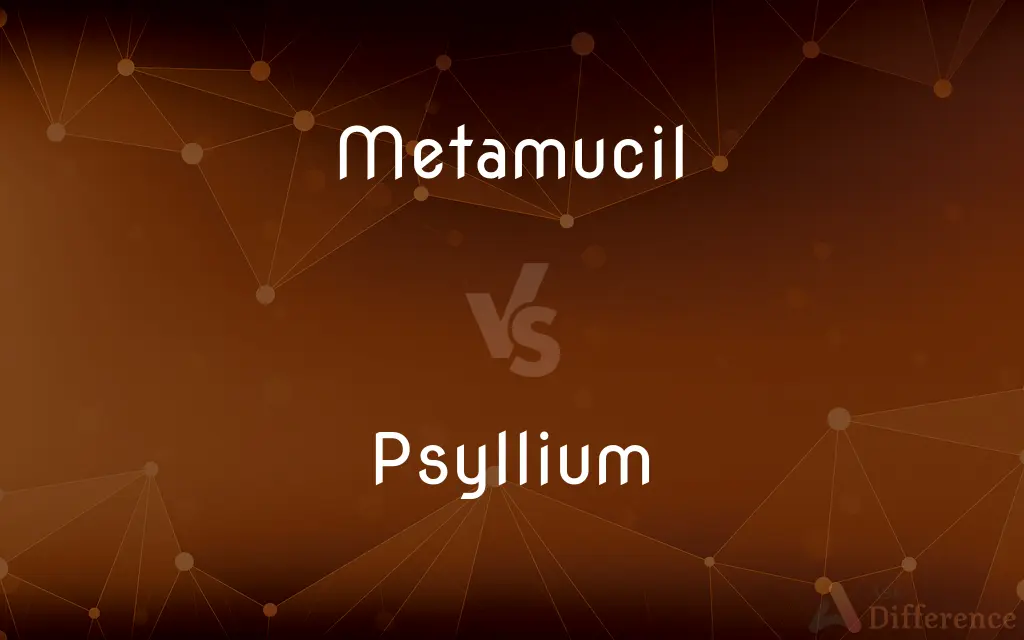Metamucil vs. Psyllium — What's the Difference?
By Urooj Arif & Maham Liaqat — Published on March 7, 2024
Metamucil is a brand of fiber supplement that contains psyllium as its active ingredient, while psyllium refers to the natural dietary fiber itself, derived from the seeds of the Plantago ovata plant.

Difference Between Metamucil and Psyllium
Table of Contents
ADVERTISEMENT
Key Differences
Metamucil is a commercial product known for its use as a dietary fiber supplement, which aids in digestion and has been marketed for improving gut health, lowering cholesterol levels, and aiding in weight management. The primary ingredient in Metamucil is psyllium husk, a form of soluble fiber that absorbs water in the intestine to form a viscous compound, aiding in bowel movements.
Psyllium, on the other hand, is the generic name for the fiber extracted from the husks of the Plantago ovata plant's seeds. It is available in various forms, including powders, capsules, and husks, and is incorporated into a wide range of products beyond Metamucil, including other dietary supplements and natural health products.
Metamucil and psyllium are often spoken of interchangeably due to Metamucil's popularity and widespread use, but it's important to recognize that psyllium can be found in many other brands and forms. Consumers may choose Metamucil for its brand reliability, flavor options, and ease of use, but those looking for a more natural or less processed form of psyllium may opt for products labeled simply as "psyllium husk."
The effectiveness of psyllium, including when consumed as part of Metamucil, is largely attributed to its fiber content. Both aid in digestive health by increasing stool bulk and softening, making it easier to pass and reducing constipation. Additionally, psyllium can help lower cholesterol levels and control blood sugar when taken regularly as part of a diet low in saturated fat and cholesterol.
Choosing between Metamucil and generic psyllium products may come down to personal preferences regarding flavor, price, and brand trust. However, it is crucial for consumers to check the product labels for any additional ingredients, such as sweeteners or flavorings, that may be present in branded products like Metamucil but not in generic psyllium husk supplements.
ADVERTISEMENT
Comparison Chart
Ingredient
Psyllium husk (soluble fiber) plus flavorings and additives
Pure psyllium husk (soluble fiber)
Form
Powder, capsules, and wafers
Powder, capsules, and whole husks
Brand
A specific brand owned by Procter & Gamble
Generic term for the fiber from Plantago ovata seeds
Uses
Dietary fiber supplement for digestive health, cholesterol management, and weight support
Dietary fiber supplement for digestive health, potentially included in other natural health products
Flavor Options
Various flavors available
Generally unflavored, natural
Additional Ingredients
May contain sweeteners, artificial flavors, or colors
Typically contains no additives, unless specified
Compare with Definitions
Metamucil
The brand provides different product forms, including powder and capsules.
Use Metamucil capsules for convenient fiber supplementation on the go.
Psyllium
Psyllium is a natural, soluble fiber from Plantago ovata seeds, aiding digestion.
Psyllium husk can naturally increase stool bulk and reduce constipation.
Metamucil
Metamucil is a fiber supplement brand containing psyllium, used to improve digestive health.
Adding Metamucil to your daily routine can help relieve constipation.
Psyllium
It's available in its pure form, without flavors or additives.
Pure psyllium husk powder can be mixed with water for a fiber boost.
Metamucil
It offers flavored options for easier consumption.
Choose orange-flavored Metamucil for a tastier fiber intake.
Psyllium
Psyllium helps maintain healthy cholesterol levels.
Daily psyllium intake is beneficial for heart health.
Metamucil
Metamucil can aid in cholesterol management.
Incorporate Metamucil into your diet to help lower cholesterol levels.
Psyllium
The fiber is versatile, found in powders, capsules, or whole husks.
Sprinkle whole psyllium husks onto your cereal for extra fiber.
Metamucil
Metamucil may contain additional ingredients like sweeteners.
Metamucil's flavored versions contain sweeteners for improved taste.
Psyllium
Psyllium is a key ingredient in many fiber supplements besides Metamucil.
Look for psyllium in generic fiber supplements for a cost-effective option.
Psyllium
Any of several annual Eurasian plants of the genus Plantago, especially P. ovata or P. afra, having opposite leaves and small flowers borne in dense spikes.
Psyllium
The seed husks of any of these plants, widely used as a mild bulk laxative and sometimes added to foods as a dietary source of soluble fiber.
Psyllium
Any of several plants of the subgenus Plantago subg. Psyllium, whose seeds are used commercially for the production of mucilage and their laxative properties.
Psyllium
Synonym of psyllium (seed) husk, especially as a dietary supplement
Psyllium
Plantain of Mediterranean regions whose seeds swell and become gelatinous when moist and are used as a mild laxative
Common Curiosities
Is Metamucil better than generic psyllium products?
"Better" is subjective and depends on personal preferences for flavor, brand trust, and tolerance for additives. Both offer similar health benefits related to fiber intake.
How should I take Metamucil or psyllium?
Both should be taken with a full glass of water to avoid choking and to ensure the fiber moves through your digestive system properly. Follow the product's dosing instructions.
Is there a difference in efficacy between Metamucil and psyllium?
Both are effective as fiber supplements due to the psyllium husk; differences in efficacy may depend on additional ingredients or individual digestive response.
Can children take Metamucil or psyllium?
Yes, but consult a healthcare provider for the appropriate dosage and to ensure it is safe for the child’s age and health conditions.
Can I take Metamucil if I'm on medication?
Consult a healthcare provider as Metamucil may affect the absorption of certain medications.
Does psyllium interfere with nutrient absorption?
Taken in moderation, psyllium should not significantly interfere with nutrient absorption.
Can Metamucil or psyllium help with diarrhea?
Yes, they can help firm up stool in cases of diarrhea by absorbing excess water.
Are there any allergen concerns with psyllium?
Psyllium is generally safe, but individuals with specific plant allergies should be cautious.
Can I use Metamucil and psyllium interchangeably?
Yes, Metamucil and generic psyllium can be used interchangeably for fiber supplementation, but be aware of any additional ingredients in Metamucil.
Can Metamucil or psyllium cause side effects?
Yes, both can cause bloating, gas, or increased bowel movements, especially when not taken with sufficient water or if dosage is increased too quickly.
Will taking Metamucil or psyllium help with weight loss?
Fiber supplements can aid in weight management by promoting feelings of fullness, but they should be used as part of a comprehensive weight loss plan that includes diet and exercise.
How long does it take for Metamucil or psyllium to work?
Effects can be seen within 12 to 72 hours, depending on the individual.
Can psyllium be added to any food?
Psyllium is versatile and can be added to smoothies, baked goods, and other dishes.
Is Metamucil suitable for a gluten-free diet?
Most Metamucil products are gluten-free, but always check the label for specific formulations.
Is it necessary to increase water intake with psyllium?
Yes, increasing water intake is crucial to prevent constipation and ensure proper fiber function.
Share Your Discovery

Previous Comparison
Synthetic Vitamin E vs. Natural Vitamin E
Next Comparison
Air Brake vs. Oil BrakeAuthor Spotlight
Written by
Urooj ArifUrooj is a skilled content writer at Ask Difference, known for her exceptional ability to simplify complex topics into engaging and informative content. With a passion for research and a flair for clear, concise writing, she consistently delivers articles that resonate with our diverse audience.
Co-written by
Maham Liaqat












































